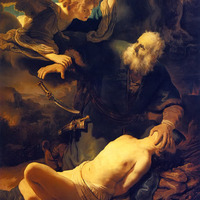Menu
- People
- Curriculum
- Foreign Study
- News & Events
Back to Top Nav
Lecture by Josef Stern (University of Chicago). Free and open to all.

Free and open to all.
An important medium for medieval philosophical discussion in all three religious faiths was philosophical exegesis of their respective scriptures. Under the aegis of Maimonides, an especially rich tradition of biblical interpretation developed among the medieval Jewish philosophers. In this lecture Stern discusses Maimonides’ interpretation of Genesis 22, the binding of Isaac, known in Hebrew as “the Aqedah,” a text he interprets as a parable that communicates philosophical wisdom at two levels, corresponding to its parabolic external (zahir) and internal (batin) meanings. He argues that Maimonides, by focusing on its ending rather than on its first ten verses, challenges almost all other readings of the story in the tradition that focus on either Abraham’s obedience or his faith, and instead reads the story as a critique of two classic models of the ideal of divine worship. Of the two models, he concentrates in this talk on the ideal of dying for God, or martyrdom, as an expression of ultimate love of God.
Josef Stern, the author of "The Problems and Parables of Law: Maimonides and Nahmanides on Reasons for the Commandments" (SUNY Press, 1998), "Adaptationsand Innovations: Studies on the Interaction between Jewish and Islamic Thought and Literature from the Early Middle Ages to the Late Twentieth Century" (Peeters, 2007) and other books, teaches in Chicago and resides in Jerusalem,and works in two main areas: contemporary philosophy of language and medieval philosophy, especially Jewish and Arabic philosophy and the work of the twelfth-century Jewish philosopher Moses Maimonides and his relation both to the Arabic philosophical tradition and to later Jewish thinkers.
Co-sponsored by the Departments of Philosophy, Religion, Jewish Studies Program, and the Leslie Center for the Humanities.
Events are free and open to the public unless otherwise noted.